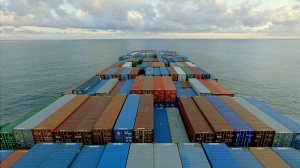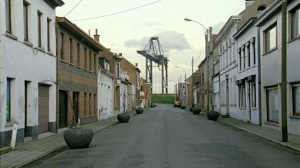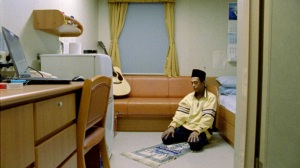 Yesterday I saw Allan Sekula and Noel Burch’s powerful film The Forgotten Space. The idea behind the film is that the sea is a space which we have come to see as nothing other than a blank surface across which vast quantities of goods can be transported in nondescript shipping containers. If we once revered the sea as a consumer of souls, today we are killing it through acidifying carbon emissions from the thousands of gigantic container ships that ply the waters of the world.
Yesterday I saw Allan Sekula and Noel Burch’s powerful film The Forgotten Space. The idea behind the film is that the sea is a space which we have come to see as nothing other than a blank surface across which vast quantities of goods can be transported in nondescript shipping containers. If we once revered the sea as a consumer of souls, today we are killing it through acidifying carbon emissions from the thousands of gigantic container ships that ply the waters of the world.
Sekula and Burch’s film offers a potent series of perspectives on the toll taken by neoliberal globalization by looking at a series of port cities:  Rotterdam, Los Angeles, Hong Kong, and Bilbao. Through interviews and haunting vignettes in each of these maritime sites and their hinterlands, Sekula and Burch show how containerization has facilitated the globalization of production while also dismantling unionized labor forces in the developed world. The result is been sweeping generation of what Zygmunt Bauman calls wasted humanity: people and places for whom the neoliberal economy no longer has any practical use.
Rotterdam, Los Angeles, Hong Kong, and Bilbao. Through interviews and haunting vignettes in each of these maritime sites and their hinterlands, Sekula and Burch show how containerization has facilitated the globalization of production while also dismantling unionized labor forces in the developed world. The result is been sweeping generation of what Zygmunt Bauman calls wasted humanity: people and places for whom the neoliberal economy no longer has any practical use.
At the same time, the “flag of convenience” rule on the high seas has meant that shipping companies can charter their boats out of highly  impoverished countries, and then staff them with an ill paid and eminently disposable labor force from underdeveloped nations such as the Philippines.
impoverished countries, and then staff them with an ill paid and eminently disposable labor force from underdeveloped nations such as the Philippines.
The Forgotten Space offers a powerful instance of what Fredric Jameson, in his well-known essay on Postmodernism, calls cognitive mapping. By literally traversing the maritime networks that link together the contemporary consumer economy, Sekula and Burch help viewers understand the toll taken on communities and individuals by today’s global economy.
The film can at times feel crushing. We are repeatedly exposed to images of gigantism and heedless development that dwarf individual experience and even cognition, not to mention political organizing. On the other hand, Sekula and Burch are careful to include instances of  resilience. So we see workers around the world finding ways to retain a sense of individual dignity and collective identity despite the often grueling conditions under which they work.
resilience. So we see workers around the world finding ways to retain a sense of individual dignity and collective identity despite the often grueling conditions under which they work.
I found the filmmakers’ interview with Chinese economist Minqi Li particularly powerful. Li, the author of The Rise of China and the Demise of the Capitalist World Economy, argues that the integration of China’s vast peasantry into the world proletariat may have given capital the upper hand for the moment by disorganizing global labor, but in the long term this strategy will spell the death of capitalism since the Chinese working class will inevitably grow more organized and more assertive. The rub, of course, is that in the not-so-long term we are likely to all be dead given the quickening onset of climate change. Nonetheless, the filmmakers supplement this anodyne theoretical point with heart-rending examples of human resiliency and fragility in the face of the neoliberal global economy.
During the question and answer session that followed the screening, Sekula commented that his film has been refused by a whole series of international film festivals, including the Tribeca film festival here in NYC and the Sundance festival. This strikes me as a real crime, although one that is not so surprising given the radical message it embodies.
Here’s a trailer for The Forgotten Space:
[vimeo http://vimeo.com/14987749]